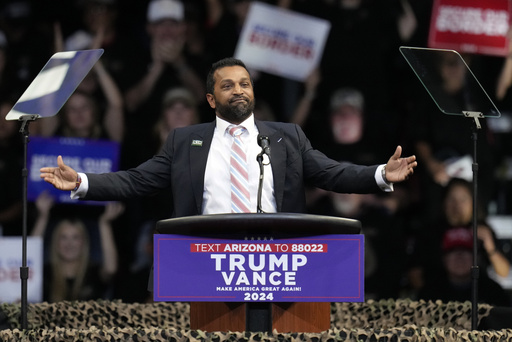WASHIGTON — Kash Patel, a prominent figure in Donald Trump’s inner circle, is gaining attention once again as he has been nominated to lead the Federal Bureau of Investigation (FBI). Known for his unwavering support for Trump and critique of the FBI and intelligence agencies, Patel is preparing for a challenging Senate confirmation process. This scrutiny not only concerns his loyalty to Trump but also his calls for substantial changes to the FBI—positions he has articulated during interviews and in his writings over the past year.
Patel has expressed a radical vision for the future of the FBI, including the controversial idea of closing the current FBI headquarters in Washington, D.C. This facility, which has been in use for half a century, houses many of the agency’s key personnel. Patel remarked in a September interview, “I’d shut down the FBI Hoover Building on day one and reopen it the next day as a museum of the ‘deep state.’ Then, I’d take the 7,000 employees that work in that building and send them across America to chase down criminals. Go be cops. You’re cops — go be cops.” Despite its provocative nature, implementing such a plan would face significant legal and logistical challenges, indicating it might be more of a rhetorical statement than a feasible plan.
He has also written about the need to relocate the FBI headquarters from Washington, arguing that it could help the organization avoid political entanglements. The future of the J. Edgar Hoover Building is already uncertain, with the General Services Administration selecting a site in Maryland for a new headquarters. Concerns over conflicting interests during the selection process have been raised by current FBI Director Christopher Wray.
Additionally, Patel has claimed that he intends to pursue those he perceives as “conspirators” in the government and media. In an interview, he made unverified statements regarding President Biden and alleged election fraud. Patel declared, “We’re going to come after the people in the media who lied about American citizens, who helped Joe Biden rig presidential elections.” This could imply a move toward stricter actions against officials who share sensitive information with the media, potentially either reversing or challenging current Justice Department guidelines that protect journalists from having their records seized in relation to leak inquiries.
His stance on media and government accountability suggests a shift in how the FBI might approach investigations related to leaks of government secrets. Patel’s book contains a list of former officials he identifies as part of a so-called “Executive Branch Deep State.” While the FBI is inherently limited in its ability to initiate criminal investigations without a legitimate purpose, the authority to bring federal?? has largely been the responsibility of the Justice Department, which could see a change if Patel is confirmed, especially as Trump is also looking to appoint a new attorney general.
On the topic of surveillance reforms, Patel has criticized the FBI’s surveillance practices under the Foreign Intelligence Surveillance Act (FISA), calling for “major, major” reforms. This stance aligns him with individuals across the political spectrum who have questioned government surveillance practices. However, it conflicts with the FBI leadership’s need to maintain capabilities for investigating potential threats. The ongoing debate around Section 702 of FISA, which allows the collection of foreign communications without a warrant, has been contentious, with concerns about the FBI’s misuse of this authority.
Patel has been vocal about his discontent regarding FISA reauthorization, lamenting that Congress did not enact the much-needed reforms he believed were necessary. His book suggests that it would be beneficial for defendants’ rights to have federal defenders present during FISA court proceedings, a significant departure from current practices.
Furthermore, Patel supports a reduction in the overall size of the federal intelligence community, even suggesting a separation of the FBI’s intelligence operations from its crime-fighting missions. This proposal raises questions about its practicality since intelligence gathering is central to the FBI’s function. Current FBI Director Wray has emphasized the importance of maintaining robust intelligence capabilities, particularly in light of rising global threats.
The conversation surrounding Patel’s potential leadership of the FBI has inspired deep concern from some experts, who argue that breaking up the agency’s intelligence operations could undermine its effectiveness. Experienced former officials, like Frank Montoya Jr., have voiced their disagreement with the idea, asserting that such a move would dilute the FBI’s ability to respond to current and emerging challenges.



